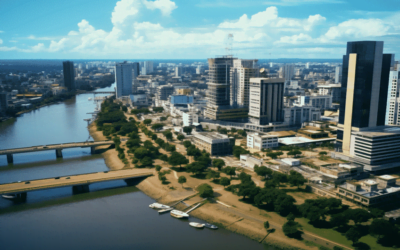Hey there, fellow drone enthusiasts and curious minds! If you’ve found your way here, I’m guessing you’re as passionate about drones as I am. Or perhaps you’re a newbie looking to explore the drone scene in Senegal.
Well, you’re in the right place because I know how bewildering it can be to navigate the intricate world of drone laws, especially in a country like Senegal.
You might be wondering about the rules and regulations governing drone use, and let me assure you, I’ve been there too.
So, let’s dive right into it. I’ve done my homework, poured over pages of information, spoken with local experts, and even connected with the drone community in Senegal to gather the most up-to-date insights on Senegal’s drone laws.
The goal? To provide you with clear, concise, and trustworthy information that will make your drone adventures in Senegal not just thrilling but also entirely legal. You won’t have to sift through heaps of confusing jargon and outdated websites. I’ve got the scoop, and I’m ready to share it.
Now, here’s the exciting part – everything you need to know about Senegal’s drone laws is just a scroll away. From the nitty-gritty details on where and when you can fly your drone to understanding privacy concerns and respecting the airspace, we’ve got you covered.
So, if you’re eager to embark on safe and unforgettable drone journeys in Senegal, go ahead and read on. Trust me, you won’t want to miss this insider’s guide to Senegal’s drone laws. Let’s make sure your drone flights are not only awe-inspiring but also completely hassle-free.
- General Regulations for Drone Operators in Senegal
- Classification of RPAS in Senegal
- Senegal Drone Authorization Procedures
- Specific Considerations for Foreign Operators in Senegal
- Bringing Your Drone on Airplanes Guide to Senegal
- Final Thoughts on Senegal Drone Laws
- Frequently Asked Questions About Senegal Drone Laws
General Regulations for Drone Operators in Senegal

Before we soar into the thrilling world of drone adventures in Senegal, it’s vital to know the lay of the land—or rather, the sky.
Senegal’s drone regulations are there to ensure everyone enjoys their drones safely and responsibly.
In this section, we’ll explore the rules and requirements for drone operators, ranging from registration and licensing to the qualifications you need. But first, let’s start with the basics.
Registration and Licensing Requirements
Picture this: You’ve just unboxed your brand-new drone, and you’re itching to take it for a spin over Senegal’s stunning landscapes.
But hold on—before you send it soaring, you’ll need to get the paperwork sorted. Senegal requires drone operators to register their drones and obtain the necessary licenses.
These documents not only give you the green light to operate your drone legally but also ensure you’re held accountable if things don’t go as planned.
Minimum Age and Operator Qualifications
Now, let’s talk about who can actually take the reins of that marvelous flying machine. Senegal has set a minimum age for drone operators, making sure young, aspiring pilots have a bit of growing up to do before they can command these flying robots.
As for qualifications, there are certain skill sets you should possess to operate a drone safely. After all, we’re not just playing with toys here – these are sophisticated pieces of technology that need a steady hand and a sharp mind.
Restrictions on Drone Operation
Alright, you’re registered, you’ve got your license, and you’ve met the age and qualification criteria. It’s time to get airborne.
However, don’t forget—the skies have rules of their own. Let’s look at some of the key restrictions you’ll face when operating a drone in Senegal.
Flying Over People and Large Crowds
Imagine you’re at a bustling beach in Dakar, and your drone is raring to capture the vibrant scene from above.
Well, Senegal has a rule – it’s a no-fly zone over people or large crowds. It’s all about safety first. Avoiding these areas ensures you’re not putting anyone at risk from unexpected drone mishaps. Keep your flights awe-inspiring but considerate.
Respecting Privacy
Privacy is a big deal, even in the skies. As drone pilots, we must respect the privacy of others. Just like you wouldn’t peek over your neighbor’s fence, it’s essential to avoid invasive flights over private properties or people’s homes.
Senegal’s laws make sure everyone can enjoy peace and tranquility without unwanted aerial intrusions.
No-Fly Zones Near Airports
Airports are buzzing hubs of activity, and safety here is paramount. Senegal strictly prohibits drone flights in and around airports.
You wouldn’t want your drone to be a distraction to pilots or air traffic control, would you? It’s all about sharing the skies responsibly.
Daylight and Weather Conditions
Nature can be unpredictable, and Senegal’s skies are no exception. Senegal’s regulations dictate that drones should only take off during daylight hours and in good weather conditions.
Think of it like driving a car—you wouldn’t hit the road when you couldn’t see properly or during a storm, right?
Prohibited Areas (e.g., Government and Military Facilities)
There are places drones just shouldn’t go. Government and military facilities are off-limits. Flying your drone near these areas can raise security concerns and isn’t something you’d want to deal with. Remember, it’s all about safety and responsibility when piloting your drone in Senegal.
Also Read: Scotland Drone Laws 2024
Classification of RPAS in Senegal

As we journey deeper into the realm of Senegal’s drone laws, it’s essential to understand how Remotely Piloted Aircraft Systems (RPAS) are classified in this West African nation. These classifications help categorize drones based on factors like weight and their intended use.
This section unravels the intricacies of Senegal’s RPAS classifications, so you can navigate the skies smoothly.
Classification based on Maximum Take-Off Weight
Picture this: You’re preparing for a drone flight in Senegal, but before you take off, you should know that Senegal classifies drones based on their maximum takeoff weight.
This weight plays a pivotal role in determining which set of rules and regulations your drone will adhere to.
Whether you have a lightweight drone or a heavy-duty one, Senegal’s drone classifications have got you covered.
Categories and Purpose-Specific Regulations
Let’s dig deeper into Senegal’s drone classifications, shall we? Beyond the weight-based categorization, there are various categories that cater to different purposes, whether it’s for leisure, sport, or professional endeavors.
The rules can get quite specific, so it’s essential to know where your drone falls and what regulations apply.
Leisure and Private Use (1A)
Imagine a beautiful Senegalese sunset, and you want to capture this breathtaking moment with your drone. For those leisurely flights, Senegal has regulations under category 1A that ensure your fun remains safe and respectful.
These rules are designed to maintain a balance between recreational drone use and the safety of all.
Aeromodeling and Sport (1B, 2B)
If you’re into aeromodelling or sports, Senegal still has you covered. Whether you’re competing in a thrilling drone race or showcasing your aerobatic skills, the 1B and 2B categories are where you belong.
These rules provide the framework for pursuing your passion while making sure it’s done responsibly.
Professional or Commercial Purposes (1C, 2C)
If you’re a professional or using your drone for commercial purposes, Senegal offers a different set of rules under categories 1C and 2C.
Whether you’re a filmmaker capturing stunning aerial shots or using your drone for agriculture, these regulations provide a clear path for you to follow. It’s about combining innovation with responsibility.
Exceptional RPAS Authorization (1C, 2C)
Sometimes, your drone-related endeavors might be exceptional – and Senegal recognizes that. If you find yourself in a unique situation or need to operate outside the standard regulations, there’s a provision for exceptional RPAS authorization. Just like an extraordinary circumstance requiring a specialized solution.
Issuance of Permits for Drones Exceeding 25 kg (3C)
Imagine you have a heavy-duty drone, one that exceeds 25 kg, and you want to fly it in Senegal. For such robust drones, Senegal requires permits.
This ensures that the operation of these massive machines is conducted with the utmost care and adherence to safety standards.
It’s all about balancing innovation with responsibility, even when dealing with the big birds of the drone world.
Also Read: Saudi Arabia Drone Laws 2024
Senegal Drone Authorization Procedures

While drone flying can be exhilarating, Senegal’s regulations ensure that it’s a safe and well-controlled experience.
The process to get the necessary authorizations and permits might seem intricate, but I’m here to guide you through the various phases. Let’s embark on this journey to uncover the drone authorization procedures in Senegal.
Pre-Application Phase
Before you can take to the skies, you’ll need to go through the pre-application phase. It’s the initial step in obtaining your drone authorization, and it’s all about getting in touch with the right authority and submitting the required documents.
Contacting the Authority (ANACIM)
Imagine this step as reaching out to your travel agent to plan an exciting trip. In this case, you’ll be contacting ANACIM, the governing body responsible for all things related to drone regulations in Senegal.
They’re your go-to source for information and guidance. It’s like seeking advice from a seasoned traveler before setting out on an adventure.
Submission of Required Documents
Think of this part as the paperwork you need for your journey. In Senegal, you’ll have to submit certain documents to ANACIM.
These documents will vary depending on your drone’s purpose and category. It’s akin to having the right visas and identification when you travel to a foreign country. Ensuring you’ve got everything in order is crucial to proceeding smoothly.
Formal Request Phase
Once you’ve contacted ANACIM and submitted the necessary documents, you’ll enter the formal request phase.
This is where ANACIM evaluates your application, making sure everything is complete and relevant to your drone’s operation.
Evaluation of Completeness and Relevance
Imagine you’re packing your suitcase, and you’ve got a checklist to ensure you don’t forget anything essential for your trip.
In this case, ANACIM will evaluate your submission to ensure it’s complete and relevant to your drone’s operation. They want to make sure you’ve got everything you need for a safe flight.
Risk Assessment Process
Think of this as a safety check before boarding a flight. ANACIM will conduct a risk assessment process to evaluate the potential risks your drone operation might pose. It’s akin to the security measures at an airport, ensuring a safe journey for everyone involved.
In-Depth Study of Submitted Documents
Once ANACIM has reviewed your application and assessed the risks, they’ll conduct an in-depth study of the documents you’ve submitted. This thorough examination ensures that all regulations and safety standards are met.
Demonstration and Inspection Phase
Imagine this as the moment when you’re demonstrating your skills to pass through customs. ANACIM may require a demonstration of your drone’s capabilities and an inspection to ensure it meets all safety and operational requirements.
Issuance of Authorizations and Permits
After successfully navigating through the previous phases, you’ll reach the culmination of the process—the issuance of authorizations and permits.
It’s like receiving your boarding pass for a flight. Once you have these in hand, you’re ready to take to the skies, knowing you’ve followed Senegal’s drone regulations to the letter.
Also Read: Sao Tome and Principe Drone Laws 2024
Specific Considerations for Foreign Operators in Senegal

If you’re a drone enthusiast from another country planning to take your drone on an adventure to Senegal, there are a few specific considerations you’ll need to keep in mind.
Senegal welcomes foreign operators, but it’s important to understand the regulations that apply to you.
Import License Requirements
Before you embark on your journey to Senegal with your beloved drone, consider it somewhat like bringing a pet across international borders.
Just as you’d need the right documentation and approvals for your furry friend, your drone requires an import license.
You’ll have to obtain this license to bring your drone into the country. Much like ensuring your pet meets the necessary health and safety standards, the import license ensures your drone complies with Senegal’s regulations.
Approval for Flying Drones in Senegal
Think of this as gaining permission to explore a national park. In Senegal, you’ll need approval to fly your drone.
It’s not much different from seeking permission to explore the stunning landscapes of a protected area.
Obtaining this approval is crucial, as it ensures you’re well aware of Senegal’s drone laws and its commitment to safety in the skies.
Regulatory Guidelines for Travelers Bringing Drones
This part is similar to the guidelines travelers receive when visiting a foreign country. Senegal has clear regulatory guidelines for travelers who bring drones into the country.
Think of it as a traveler’s guide, but for drones. It outlines the do’s and don’ts, ensuring you’re well-prepared and informed about what to expect.
By adhering to these guidelines, you can have a seamless and enjoyable drone-flying experience in Senegal.
Also Read: San Marino Drone Laws 2024
Bringing Your Drone on Airplanes Guide to Senegal

If you’re like me, your drone isn’t just a piece of equipment; it’s your trusty companion for capturing breathtaking aerial views.
So, what do you do when you want to bring it on your adventures, especially if you’re flying to Senegal? Well, here’s a guide to ensure your drone makes the journey safely.
The Importance of Carrying Drones in Carry-On Luggage
Imagine your drone as your co-pilot on this epic journey. When you’re flying, it’s essential to have your drone with you in the cabin, just like your co-pilot should always be in the cockpit.
According to the Montreal Convention, airlines are liable for losses up to around $1,000 USD. Now, if your drone is worth more than that, it should always have a seat right next to you. It’s not just equipment; it’s your travel buddy.
Prohibitions Regarding Drone Batteries in Checked Baggage
You wouldn’t put your precious and delicate belongings in the hands of fate, would you? Well, the same applies to your drone’s batteries.
Never, I repeat, never put them in your checked baggage. Lithium-ion batteries, the life force of your drone, are considered “dangerous goods” by airlines.
So, follow this one golden rule – these batteries belong with you in the cabin. Neglecting this might lead to the airline seizing them or, even worse, you getting fined.
Using Safety Bags for Lithium-Ion Batteries
Think of safety bags for your lithium-ion batteries as their personal bodyguards. They’re your guarantee that nothing unexpected will happen during the flight.
Given the strict rules surrounding these batteries due to a few incidents in the past, these bags are a must-have.
Just like you wouldn’t go skydiving without a parachute, don’t let your batteries fly without their safety bags.
Considerations for Drones Valued Over the Airline’s Liability Limits
Now, this is where it gets interesting. If your drone is a high-end model worth more than the airline’s liability limit, you need to think ahead.
The liability cap often doesn’t cover the full cost of your drone. What’s the solution? Well, consider shipping it using trusted courier services like DHL, FedEx, or UPS. This way, you can ensure it’s well protected and insured for its full value.
Using Courier Services for Valuable Drones During International Travel
Couriers are like the guardians of your precious cargo. They’ll handle your drone with the care it deserves.
So, when you’re traveling internationally and your drone’s worth a pretty penny, courier services become your best friend. They’ll make sure your drone arrives safely, ready to take on the skies in Senegal.
Also Read: Samoa Drone Laws 2024
Final Thoughts on Senegal Drone Laws

Well, my fellow drone enthusiasts, we’ve reached the end of our journey through Senegal’s drone laws. Before we part ways, let’s take a moment to recap the key points and understand why they matter.
To navigate the skies of Senegal, we’ve learned that there are crucial rules in place. Firstly, you need to register your drone and acquire the necessary licenses. Depending on your drone’s purpose and size, you’ll fall into specific categories with tailored regulations. Then, when it comes to flying, you must avoid large crowds, respect people’s privacy, steer clear of airports, choose clear weather conditions, and steer clear of sensitive areas. These laws are not just there for the sake of it; they ensure safe and responsible drone use.
Now, why should we bother with all these rules, you might wonder? Well, it’s all about safety and compliance. Drones are amazing tools for capturing stunning visuals and gathering data, but when misused, they can pose risks. By adhering to Senegal’s drone laws, we’re contributing to the safety of our fellow citizens, respecting their privacy, and avoiding potential accidents near airports. Moreover, staying compliant helps us avoid hefty fines and enjoy our drone flights without any legal hassles.
So, as you prepare for your drone adventures in Senegal, remember to abide by these laws. It’s not just about following rules; it’s about ensuring that every flight is a safe and rewarding experience. Fly high, but do it responsibly!
Frequently Asked Questions About Senegal Drone Laws
1. Do I need to register my drone in Senegal?
Absolutely. To operate a drone in Senegal, registration is a must. Senegal’s civil aviation authority, ANACIM, oversees this process.
As a responsible drone operator, you should obtain the necessary licenses and permits, ensuring your drone is registered under the appropriate category based on its maximum take-off weight and purpose.
This registration not only keeps you on the right side of the law but also helps authorities monitor and manage drone activities for safety and security.
2. What are the restrictions on drone operation in Senegal?
Senegal has some clear rules in place to ensure safe and responsible drone use. You must avoid flying your drone over people or large crowds, as accidents can happen and safety is paramount. Respect others’ privacy by not invading their personal space with your drone.
Stay away from airports and aircraft operating areas to avoid potential conflicts and collisions. Senegal also dictates that you should fly during daylight hours and in good weather conditions, ensuring optimal visibility and safety.
Finally, steer clear of sensitive areas, such as government or military facilities, where drone use is prohibited.
3. Can I bring my drone on an airplane to Senegal?
Yes, you can bring your drone to Senegal when traveling by air, but there are specific guidelines to follow. It’s advisable to carry your drone in your carry-on luggage rather than checking it in your checked baggage.
This is not just a matter of convenience but also of security. Airlines are generally liable for losses up to a certain amount, typically around $1,000 USD, as per the Montreal Convention.
If your drone is worth more than this, consider shipping it with a reputable courier service like DHL, FedEx, or UPS and fully insuring the shipment.
Also, remember not to place drone batteries in your checked baggage to comply with strict safety regulations related to lithium-ion batteries.
4. Are there different regulations for foreign drone operators in Senegal?
Senegal’s drone laws apply to both local and foreign operators, but there are specific considerations for foreign drone enthusiasts.
Import licenses are required for bringing drones into the country. You’ll need approval from Senegal’s authorities to fly your drone within its borders.
It’s essential to adhere to Senegal’s regulatory guidelines for travelers bringing drones, as failure to do so can result in legal issues.
5. How can I obtain authorization for drone operations in Senegal?
The authorization process in Senegal is a multi-step journey. In the pre-application phase, you’ll need to contact ANACIM, the regulatory authority, and submit the required documents.
Once your application is in, the formal request phase begins, where authorities assess the completeness and relevance of your documents. A thorough risk assessment is conducted during this stage. Afterward, there’s an in-depth study of the submitted documents. If your application progresses, you might undergo a demonstration and inspection phase.
Finally, if all requirements are met, ANACIM will issue the necessary authorizations and permits, allowing you to enjoy safe and legal drone flights in Senegal.













